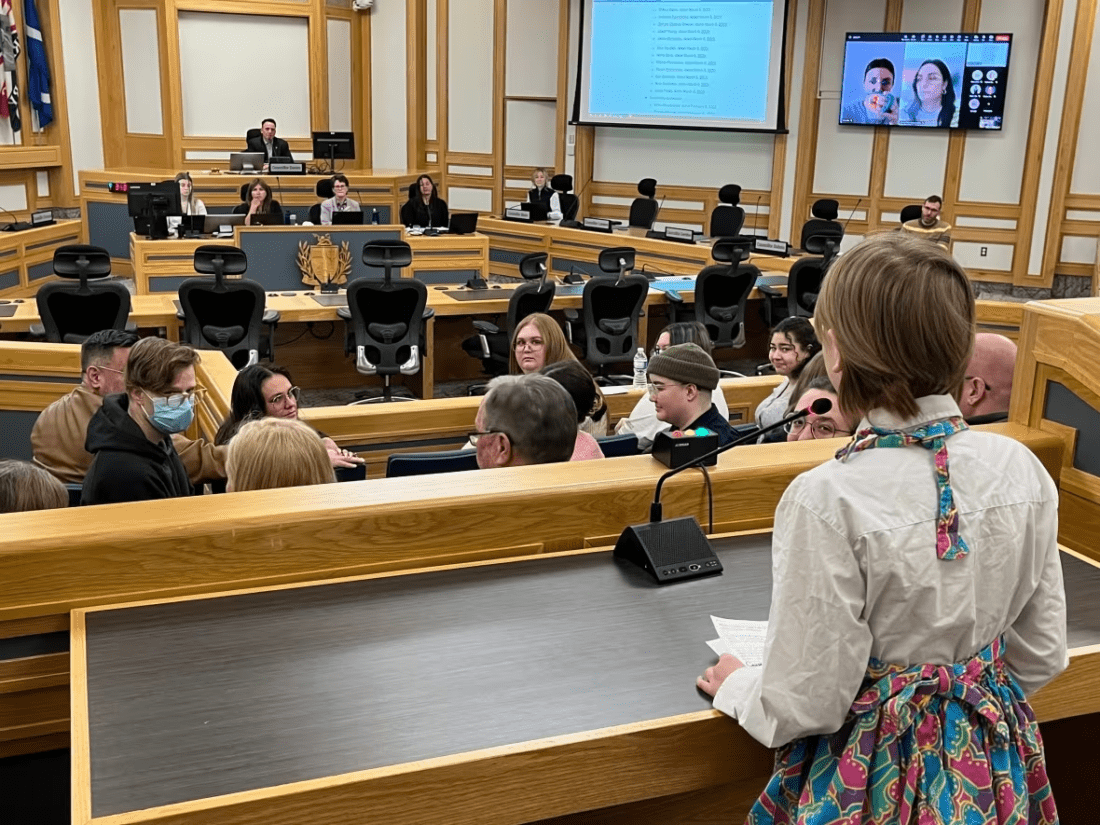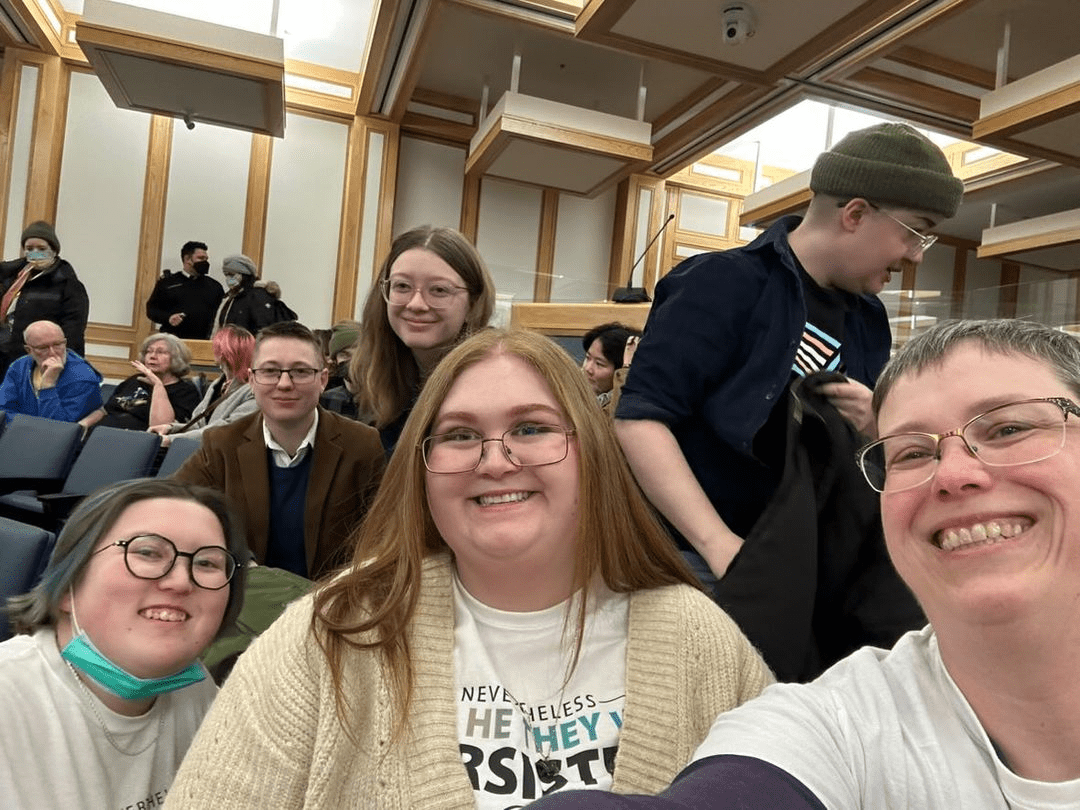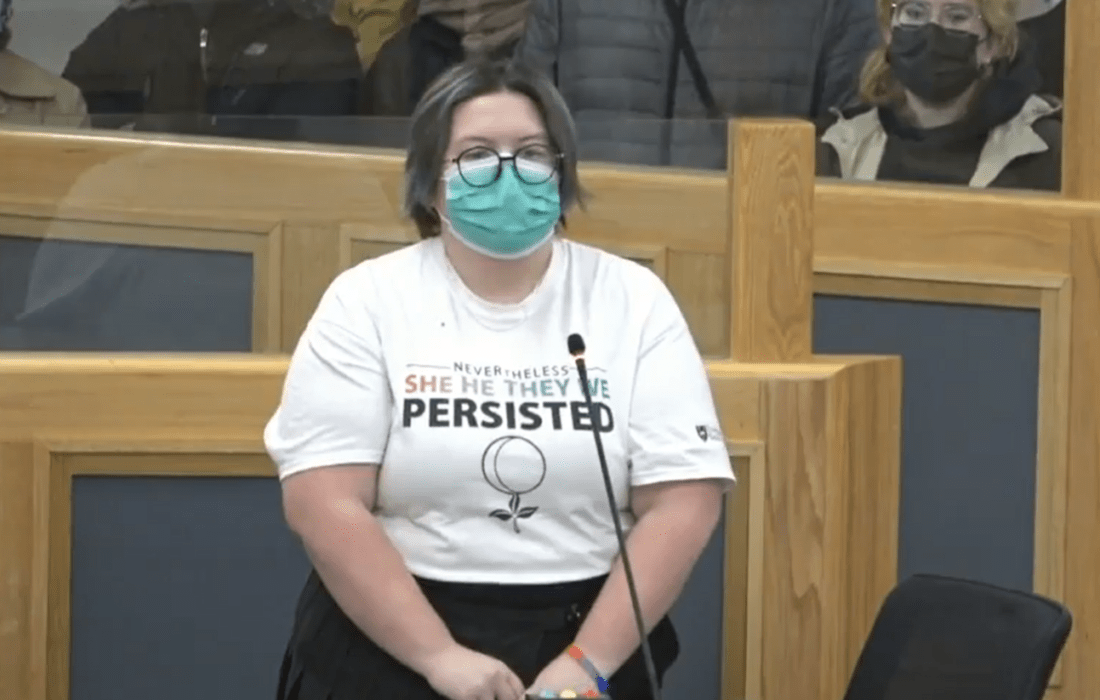Saskatoon’s trans community came out in force at City Hall.
The following article contains potentially triggering discourse surrounding transphobia and a notably transphobic figure.

On International Women’s Day, March 8, Saskatoon’s trans community and allies filled the seats of Saskatoon City Hall. With Mark Friesen, noted adversary to trans rights, set to speak before city council, Blake Tait (he/him/his) led the counter movement to advocate for trans people. This arrangement to speak in front of Saskatoon’s city council quickly swelled into a series of speeches about the importance of trans rights.
In the United States, numerous anti-trans bills have recently been passed and heavily supported. To witness trans identities remain under attack in a country that borders us is frightening to Canadian 2SLGBTQ+ communities.
Friesen’s attempts to sway the city into barring gender-affirming access to change rooms and washroom facilities proved unsuccessful in this recent occurrence at City Hall. The City of Saskatoon declared that they will not make any changes to current Gender Inclusive Change Rooms/Washrooms policies, which currently dictate that “patrons can choose the change room or washroom that aligns with their gender identity.”
While there will be no backwards changes to this policy, it is pertinent to recognize the impact that these mainstreamed discussions of trans rights have taken on Saskatoon’s trans and 2SLGBTQ+ communities. In the wake of intense violence and suppression towards trans peoples in the United States, it is important to continue to acknowledge that trans rights are not in the clear and there is still plenty that must be done to create a safe and inclusive environment for trans individuals everywhere.
USask’s Women’s and Gender Studies Agents are a newly reinstated and ratified group on campus who are “committed to merging campus based and community based activist effort.” Sara Pilon (she/her), the group’s president, and Kelly Lam (she/they), the group’s vice president, both attended the City Hall event alongside other members of their group. In an interview with these two particular members, there was clearly an extremely positive sentiment surrounding the event. Lam said that “it was amazing to see so much support from the community, not just from the queer community but from allies as well.” When asked what allies can do to make things easier for queer individuals, Pilon, who identifies as a cis-woman, says it is best to “take your cues from the community,” which led Lam to follow up by saying “don’t overtake queer and trans voices.”
Coming up March 31 is Trans Day of Visibility. Considering the whirlwind of emotion that the Saskatoon trans community has experienced, especially in these past three months, it is more important now than ever to reach out to your trans and queer peers and ask them what you can do to make them feel more visible. Reflect on what others are doing, listen to trans voices and act on what they ask of you. Also keep in mind that a trans identity does not automatically mean that someone is willing to educate you.
In light of Kelly and Sara’s suggestions, this publication wanted to amplify some of the trans and ally voices which filled Saskatoon’s City Hall. Pronouns will be indicated as (and if) provided.
Janna Barnatsky (they/them):
“I understand firsthand that discussing a topic you may not fully understand can be intimidating, confusing, or otherwise difficult.” They then proceeded to list various definitions to the council and audience. “Sex is about your genetics, while gender is about the social and cultural factors that make you who you are”, they said. “There are limitless labels and identities for gender.”
Linda Frank tearfully discussed the topic of white, cis and heterosexual privilege in her speech, stating that these parts of her identity provide her “significant inherent privilege as I navigate my daily life. I am accorded a level of unconscious daily living respect, dignity and safety.” These words are especially important in understanding the world that trans people live in.
Blake Tait (he/him):
“I am proud and honored to have spoken on behalf of my trans siblings today, and I hope that my words have proven that those in opposition of this policy are fearmongering in a thinly veiled attempt to segregate and conceal transgender people from public life in Saskatoon,” he said. “The current policy is more than just a sign of support, but is on the whole beneficial and safer for all citizens of Saskatoon.”
Kelly Lam (she/they) identified the hypocrisy surrounding Friesen and his supporters’ values.
“The attitudes and behaviors of the individuals opposing the city’s current policies only perpetuate the very violence they claim to be against. In change room facilities, transgender and non-binary youth are the group most likely to be physically and sexually assaulted. Where is the righteous anger for our gender diverse youth whose safety is routinely at risk in these contested spaces? Where is the outcry of support from our opposition, whose primary concern is supposedly the safety of children and youth in our community.”
While Tait’s speech covered legal facts in great detail, some other speakers alo discussed Canadian law. Alexander Edmunds stated that “this protest is transphobic and contradicts the Canadian Charter of Rights and Freedoms,” in reference to the Shaw Center protests conducted by Friesen. Edmunds also mentioned that they received death threats for having participated in the counter-protests.
Amy-Jo Setka stated in her speech that gender neutral restrooms would work to help decolonize gender and sex in Canada’s communities: “I’d like to actually start by rejecting the framing and imposition of the binary as an act of colonial violence. This is Treaty 6 territory and Cree folks actually have more than two gender categories and always have.”
Brielle Bright (she/her) highlighted the lack of empirical evidence of Friesen’s call for restricting trans gendered bathroom use, saying that Friesen’s group “are ostensibly proposing these limitations in the interest of protecting women and girls. My question is, from what? Again, no studies indicate that trans women commit crimes at a rate exceeding that of the general population.” Bright continued, “If a man wants to harass or assault a woman or a girl (cis or trans), he will do so regardless of whether he does it in the women’s or the men’s restroom.” She continued by stating that no one should push her out of public spaces “based on their own fears and misconceptions,” further emphasizing that Friesen’s fears were unfounded.
Gabriela Fuentealbe appeared in front of the city council to acknowledge Saskatoon’s trans community and stated “private or separate bathrooms are also a problem because it just pushes more segregation.” She further stated that gender neutral and family washrooms need to be more accessible within Saskatoon’s community. “People use washrooms for the same reasons, people use changerooms for the same reasons. Everyone wants privacy.”
Zefram Downer said that “research demonstrates that it is not cisgender children who are the most vulnerable people in accessing public facilities, but rather it is transgender youth, who have restrictions to use legislated against them.” This is in reference to the bio-essentialist language used in Canadian and Saskatchewan law (in which it is inferred that sex is equivalent to gender). “This [protest] is targeted harassment on the part of a political party.”
Jared Young described how fear mongering works its way into accessible media. He referred to multiple studies which use “terminology consistent with that of anti-trans groups.” Young went on to describe multiple similar incidences of calls against trans rights, and how they follow a similar pattern. “In every case,” Young said, “the one spreading the story, the ones organizing a public response have vested interests in promoting these incidents and a history of targeting transgender individuals.”
Zipp Neufeld (they/them), a ten-year old non-binary member of the Saskatoon community (and now an honorary USask WGST Agent), started their speech by asking “at what point do I go from being someone you protect to someone who is a threat, not based on my heart or any other actions, but just based on my genitalia and your ignorant ideas of what you think who I am means?”
“When trans adults thrive, trans kids survive,” Neufeld finished.
Ashley Dyck cited Noah Ruiz’s story, in which he, a trans man, was assaulted for using the bathroom that he was instructed to use: the women’s restroom. Dyck said, “Ruiz was trying to follow the rules and keep the peace the way the complainants here today are suggesting and he was assaulted anyway.”
Wayne Fernandes shared a fear towards the potential for policy change while describing trans Saskatoonians as “not just statistics. They are people, they are citizens, and they are taxpayers here. They deserve to be treated safely.” Fernandes stated that making a change would “not actively protect people, but it will actively put people in harm’s way.”
Sarah Smokeyday said “I do not need a cis man speaking for me, on behalf of me, or over me, especially on International Women’s Day,” while looking towards the area where Friesen sat. When discussing her history of sexual abuse, she said that “the safety I found was with my friends in the queer community. It was safe from judgment, full of understanding, and a truly safe place to be.”
Leo Salamon (he/they) mentioned that “the government has a fundamental duty to its citizens to protect them, to uphold their rights, to uphold their safety. This includes the 1 in 300 Saskatchewan citizens who identify as trans.”
Kyle Anderson further evolved the topic of fear mongering by saying that “Canadian national statistics tell us that transgender and gender nonconforming people are not the perpetrators put forth in the false narratives pushed by those with hateful political agendas.”
Of the 16 speakers that day, 14 spoke in passionate favour of trans rights. The City Hall chamber was packed, standing room only. Several times, when a trans rights supporter finished speaking, the room erupted with applause, despite a standing order not to clap. Support for trans rights in the City Hall seemed overwhelming. Saskatoon showed up in force to declare itself a community based on acceptance and love.


Leave a Reply